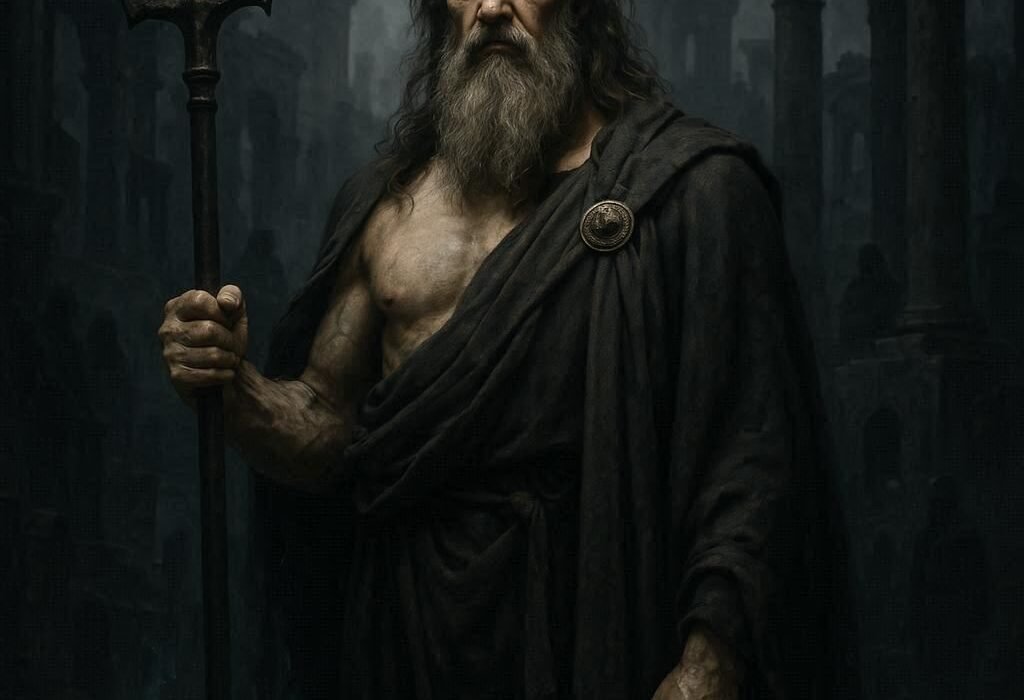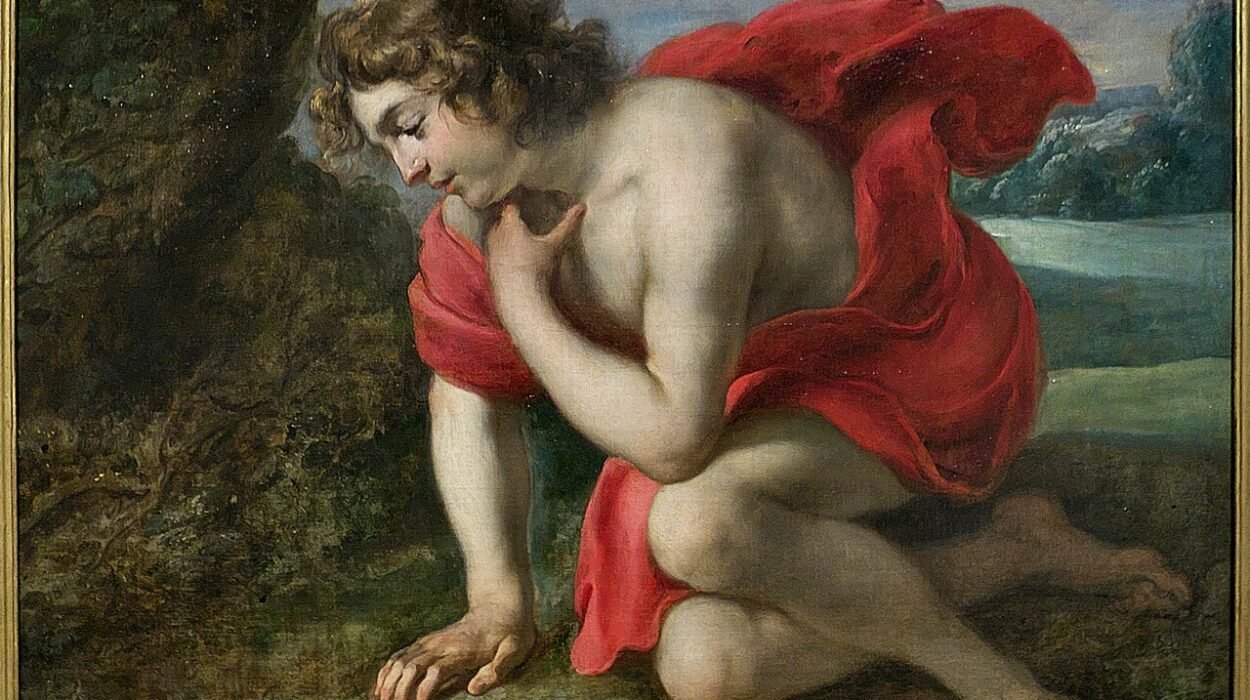In the grand tapestry of Greek mythology, few stories capture both the fragility of human choice and the inevitability of destiny like the Judgment of Paris. At first glance, it is the tale of a shepherd prince, a golden apple, and three jealous goddesses. But beneath its surface lies something deeper—a myth that explores the roots of desire, pride, and rivalry, and one that ultimately sets in motion the greatest war of legend: the Trojan War.
The myth of Paris’s choice is not a simple fable. It is an allegory, a warning, and a reflection of timeless human dilemmas. Should one choose power, wisdom, or love? Can personal desires outweigh the needs of a people? And how can a single decision, born of vanity and temptation, change the course of history?
The story of the Apple of Discord and the Judgment of Paris is as much about the gods as it is about humanity, for it speaks of how divine whims entangle mortal lives, and how beauty and ambition ignite conflicts that outlast generations. To understand this myth is to understand not only a pivotal moment in Greek mythology but also the way the ancient Greeks viewed the world—where fate, choice, and the gods interwove to shape destiny.
The Wedding Feast that Sparked a War
The story begins not with Paris but with a wedding. The sea goddess Thetis was to be married to Peleus, a mortal hero chosen by Zeus himself. This divine wedding was no ordinary event—it was meant to unite heaven and earth in celebration. Gods and goddesses gathered in splendor, ambrosia flowed, and the Muses sang.
Yet one goddess was not invited: Eris, the goddess of strife and discord. Known for sowing chaos wherever she went, she was deliberately excluded to preserve the harmony of the occasion. But Eris would not be ignored. In her fury, she arrived unbidden and cast into the banquet hall a single golden apple, inscribed with three simple but devastating words: “To the fairest.”
At once, the seeds of conflict were sown. For three of the most powerful goddesses—Hera, queen of the gods; Athena, goddess of wisdom and war; and Aphrodite, goddess of love and beauty—each claimed the apple as her own.
The Dispute of the Goddesses
The argument quickly escalated. Hera, majestic and proud, declared herself the fairest, for as wife of Zeus she ruled over Olympus with regal authority. Athena, radiant with intellect and clad in her warrior’s armor, asserted her claim as the embodiment of wisdom and courage. And Aphrodite, with her irresistible charm and enchanting smile, laughed at their pretensions, for surely no one could surpass the goddess of love in beauty.
None of them would yield. The banquet, meant to celebrate unity, dissolved into bitterness. Finally, they turned to Zeus, father of gods and men, demanding he settle the dispute once and for all. But Zeus, cunning and wise, refused. To choose among his wife and two of the most powerful goddesses would mean eternal enmity. Instead, he devised a solution: the task of judgment would be given to a mortal.
And so the fate of worlds turned toward Paris of Troy.
Paris, the Shepherd Prince
Paris was no ordinary man. Born to King Priam and Queen Hecuba of Troy, he had been marked by prophecy even before his birth. A seer had foretold that he would bring ruin to his city, and so the infant Paris was abandoned on Mount Ida. Yet fate, as always in Greek myth, had other plans. Rescued by shepherds, Paris grew into a man of striking beauty, grace, and fairness of judgment.
Unaware of his royal lineage, he lived humbly as a shepherd, tending flocks on the slopes of Mount Ida. It was here that the goddesses would find him, chosen as the mortal judge of their quarrel. To him fell the impossible decision: to declare which among the immortals was truly the fairest.
The Descent of the Goddesses
One by one, the goddesses descended before Paris in dazzling splendor, each radiant beyond mortal comprehension. Hermes, the messenger god, escorted them, bearing Zeus’s command that Paris must decide.
But how could any man choose between them? To aid their chances, each goddess did not merely display her beauty but offered a bribe, a promise that would grant Paris power beyond imagining.
Hera spoke first. With her queenly voice, she promised Paris dominion over all the lands of the earth. If he chose her, he would be made the greatest ruler of men, his name carved into history as a king above all kings.
Athena stepped forward next, her armor gleaming like sunlight on bronze. She promised him unparalleled wisdom and glory in battle. With her gift, Paris would become invincible in war, a hero sung in songs for eternity.
Then came Aphrodite, with a soft laugh and eyes that held the secrets of desire. She offered not kingdoms nor victories, but something far more intimate: the love of the most beautiful mortal woman in the world. That woman was Helen of Sparta, whose beauty was said to rival even the goddesses themselves.
Paris’s heart faltered. Kingship was tempting, and glory in battle seductive—but the promise of Helen, the most radiant of mortals, stirred his soul. And so, he placed the golden apple in Aphrodite’s hand.
The Choice and Its Consequences
The moment Paris made his choice, the fates were sealed. Hera and Athena, scorned and furious, vowed eternal hatred against him and against Troy. Aphrodite, triumphant, now prepared to fulfill her promise.
Helen, however, was no maiden awaiting a suitor. She was the wife of Menelaus, king of Sparta, and her abduction—or seduction—by Paris would ignite the greatest conflict the ancient world had ever known: the Trojan War.
Paris journeyed to Sparta under Aphrodite’s guidance. There he was welcomed as a guest, but soon, with the goddess’s aid, he won Helen’s heart. Some say he carried her away by force; others that she willingly left with him, enchanted by his beauty and charm. Whatever the truth, her departure was seen as a violation of sacred laws of hospitality and marriage.
When Menelaus discovered the betrayal, he called upon his brother Agamemnon and the oath sworn by Helen’s former suitors—that all had pledged to defend her marriage if ever it were threatened. Soon, kings and heroes from all across Greece assembled, from Odysseus to Achilles, uniting in a vast armada to sail against Troy.
Thus began a war that would last ten years, a war of gods and mortals, of honor and vengeance, and one that would end with the burning of Troy itself.
And at its root lay a single golden apple and a shepherd’s choice.
Symbolism of the Apple of Discord
The myth of the Judgment of Paris is not merely a tale of jealousy among goddesses or a prelude to war. It is a story heavy with symbolism.
The golden apple represents the dangerous allure of beauty and desire, the way vanity and competition can corrode even divine harmony. The fact that it was inscribed “To the fairest” highlights how beauty, though celebrated, can also be divisive, inciting rivalry and destruction.
Paris’s choice reflects the timeless human struggle between different forms of ambition: political power (Hera), intellectual greatness (Athena), and passion or love (Aphrodite). His decision to choose love over power and wisdom resonates across centuries, raising questions about human values and the cost of desire.
The myth also illustrates a theme central to Greek thought: that attempts to avoid fate only bring it closer. By trying to prevent the prophecy of Paris’s ruin, his parents abandoned him—yet that very act ensured his survival and eventual role in Troy’s downfall.
The Judgment as a Mirror of Humanity
The Judgment of Paris continues to fascinate because it is deeply human. Who among us has not faced choices between competing desires, knowing that each carries consequences? Who has not been tempted by beauty, by power, by knowledge? Paris’s dilemma is eternal, and though he is often criticized for choosing passion over wisdom or rule, his choice reflects the vulnerability of human nature.
The Greeks saw in this story not only a mythic cause for their greatest war but also a reflection of the fragile balance between reason and desire, pride and humility, fate and free will.
Lasting Influence on Art and Literature
From ancient vase paintings to Renaissance canvases, from epic poetry to modern retellings, the Judgment of Paris has been one of the most enduring stories in Western culture. Artists saw in the scene of the three goddesses and the mortal judge an opportunity to explore beauty, temptation, and choice. Poets and dramatists reimagined the myth to reflect their own times, using it as a lens for human vanity and the tragic weight of decisions.
The myth’s legacy is vast. It influenced Homer’s Iliad, where the war born of Paris’s choice unfolds in all its tragedy. It echoed through Euripides, Ovid, and countless later writers. Even today, the phrase “apple of discord” remains part of our language, signifying anything small that provokes great conflict.
The Tragic Weight of a Golden Apple
When we step back and look at the story as a whole, what strikes us most is not the grandeur of gods or the inevitability of fate, but the fragility of peace. A single insult, a single temptation, a single choice—these can unravel worlds.
The Judgment of Paris reminds us that wars are not always born of necessity or justice but often of pride, vanity, and passion. It teaches that beauty can both inspire and destroy, that desire can blind us to consequences, and that choices made in moments of weakness can echo for generations.
Yet it also reminds us of the humanity in myth. For Paris was not merely a pawn of the gods—he was a man faced with an impossible decision, one that reflects the struggles of all who live. His story is ours, retold through the lens of myth, reminding us of the timeless truth: that life is shaped by choices, and that even the smallest seeds of discord can grow into storms that shake the world.






